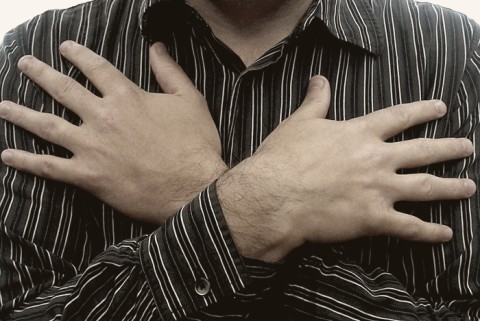Communing with the saints
At mass with my friend, I received grace through hospitality—without receiving bread and wine.

Last week Pope Francis may have suggested that Christians should move forward with sharing communion across denominations before theologians complete the work of doctrinal reconciliation. “Let’s not wait for the theologians,” he said, leaving the rest of us to ponder the implications of his remarks.
I attend a congregation in which communion is open to any willing participant. This is a commonplace in the United Church of Christ, the norm among United Methodists, and a growing trend in many Protestant churches. But I also respect my Christian friends who regard the Eucharist as a sign of church unity, one that requires doctrinal alignment or at least baptism. As I explain to my students, the table has a vertical dimension that reconciles us to God—but it also has a horizontal dimension that involves human relationships.
Last month we celebrated graduation at our seminary. During communion at our early morning baccalaureate service, I watched one member of the class of 2019 like a hawk. A fierce, theologically faithful Roman Catholic woman, Michele enrolled in seminary as her daughter was graduating. At the invitation to the table, Michele stood up. Would she receive communion at our Protestant seminary for the first time?
Not quite. Michele participated as an ecumenical guest. Arms crossed over her chest, she went forward for a word of blessing.
That’s when my tears started. But I wasn’t crying out of sadness for what I thought Michele was missing.
Rather, that moment took me back to September 2017, when my friend David Sánchez invited me to Notre Dame for a football game. Although I had just decided that I was done with football due to the head injury problem, I couldn’t resist David—or a visit to South Bend. For football fans, attending a Notre Dame home game is one way to circumvent sola fides.
David was a splendid interdisciplinary student of religion, a New Testament scholar by training whose interests ranged from Chicano identity to murals of the Irish resistance. We became friends when I reviewed his first book, From Patmos to the Barrio, the Hispanic Theological Association’s book of the year. We opened our lives to each other at conferences, via text messages, and in a few memorable rounds of golf.
On April 6 David died as the result of a heart attack he suffered while hiking. David’s soul was gentle and open; he mentored many junior scholars. No closer to him than many were, I miss him.
We did it all on that beautiful autumn day in South Bend. Toured the campus, with which he was intimately familiar. Took a group photo with members of the Band of the Fighting Irish. Visited and prayed at the grotto.
Meekly, David asked if I would join him for afternoon mass before the football game. I did.
In the past, I received communion from several Catholic priests, some of whom knew they were breaking the rules. But after participating in ecumenical dialogue and studying the question, I better understood that I should not receive the elements in a Catholic church—and also that I could benefit from the Eucharist through the hospitality and blessing of my Roman Catholic hosts. For the first time I crossed my arms, went forward for a blessing, and encountered a mild mystical experience: grace of the living Jesus mediated through the hospitality of my Catholic neighbors.
Thinking it was I who did him a favor, David thanked me for humoring him. I received the greater blessing.
Over the years this Baptist in UCC clothing has learned to revere the Lord’s Table. Ecumenical experiences have taught me that my participation joins me with believers all over the world, whom I’ll never meet. I’m still ambivalent about communing with the dead. (You can take the boy out of the Baptist church… ) But by no means am I ambivalent about the table’s power to unite us all. Although some barriers still prevent our communion with one another in important respects, the Spirit has its ways of overcoming those boundaries. I have experienced that grace.
In this season of great cultural stress, I encourage pastors to emphasize the table. When we confess our sins and receive assurance of pardon, remind us how passing the peace prepares us to share this holy meal. Remind us also that passing the peace and sharing the elements are about the most radical things American disciples can do in an age of nationalism and hate. With John Wesley, I am convinced that communion is one of our most powerful evangelistic resources.





